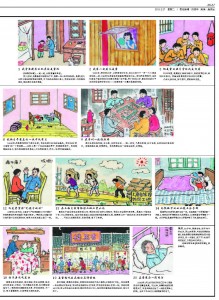Shanghai nonagenarian writes comic book memoir commemorating love of his life

Rao Pingru (饶平如) has lived a long life marked by great hardship and perseverance. Yet Rao survived war, famine, incarceration, separation and illness, and lived his entire life with undying love for one woman. Now aged 91, Rao’s long life was characterized by all the trials and tribulations that the Chinese people experienced in a turbulent twentieth century. His story is anachronistic in our current age of self-absorption and fleeting love, and will soon fade back into the mists of time. But old though he is, Rao has determined to preserve his journey and the memory of his beloved wife of 60 years, Mao Meitang (毛美棠).
So ever since his wife died in 2008, Rao has been engaged in writing a comic book history of his life and lifelong love with Mao Meitang. After working on the project daily for five years, the comic book will be finally published in April this year under the title “The Story of Us” (我俩的故事).
The Oriental Morning Post (东方早报) from Shanghai today featured Rao’s comic book history on its front page. It is a deeply moving tale. The following are the news report and some excerpts published by the Oriental Morning Post today:
Early life and war against Japan
Rao was born in Jiangxi (江西) province in 1922 as the son of Qing dynasty government official. He was only 11 years old when he first met his future wife, Mao Meitang, who was the daughter of one of his father’s close friends. She came over with her father one day, and the two of them played around the house.
A few years later, however, Rao’s life was turned upside down by the outbreak of war against Japan in 1937. In 1940, Rao was accepted for officer training at the Whampoa Military Academy (黄埔军校) in Guangdong, where the Republic of China’s officers were educated. Before he left his home in Jiangxi, his father had given him the present of a small poem, which read:
On the day that Japanese pirates invade China, it is time for the scholar to cast aside his pen (倭寇侵华日,书生投笔时).
Four months later, Rao graduated as an artillery officer in the Kuomintang army, and was sent on his way to Chengdu in Sichuan province. When there was a train, he took it, but he walked much of the way to Chengdu on foot.
Love, marriage and separation
After serving six years in the army and seeing it through all the way to the end in 1946, Rao received a letter from his dad asking him to go home and get married. In his years in the army, Rao said afterwards, he did have the chance to start intimate relationships with other women, but he always refrained from doing so – he had his eye only on Meitang.
So soon Rao found himself back in Nanchang, Jiangxi province. He and Meitang first confessed their love for each other in Hubin Park (湖滨公园), when she sang songs and he played his harmonica. Soon afterwards they were married, and in 1951 they settled in Shanghai, where Rao found a job as an accountant.
These years in Shanghai in the 1950s are the fondest memories for Rao, a time when he and Meitang could enjoy life together in peace. In 1958, however, their joyful existence was shattered when Rao was sent for Re-education through labor (劳教), because he was a Kuomintang soldier in the war. Rao was sent to a farm in Anhui province where he did backbreaking manual labor, while Meitang stayed on alone in Shanghai, eventually getting a job moving cement at a museum in the city. They would be separated for 22 years, during which time they wrote nearly a thousand letters to each other, never doubting for a moment that they will always be faithful to one another.
Reunification and illness
Rao was finally allowed to return home in 1979, and he found a job as an editor at a publishing house in Shanghai. They lived happily together once more, but misfortune struck again in 1992 when Meitang was diagnosed with diabetes and kidney problems. Gradually her condition worsened, and she became psychologically deranged as well. She finally died in hospital in March 2008. On the day of her passing, Rao was notified that his wife’s condition had suddenly worsened, and he reached her deathbed one minute before she died. He held her hand and kissed her one last time.
“The Story of Us”
Meitang’s death in 2008 inspired Rao to begin work on the comic book memoir to preserve their story for his descendants. In the years since, Rao acquired a cat to keep himself company, started learning the piano, and has worked around two hours every day on the book.
When asked whether he had anything to say to the youth of today, Rao replied the following:
Life is short, I am now already 90 years old. The older I get the more I realize that time moves very fast. If you look at the television, you see young people getting married for three months, they quarrel, and they just get a divorce. You can’t just divorce because of small things that come up. You should really treasure the time of your youth, and treasure the present. (人生苦短,我到90岁,越是年老越觉得光阴太快。你看电视,年轻人结婚三个月,吵吵架,不好就离婚。不能碰到很小的事情就离婚,应该多珍惜青春,珍惜现在。)
Links and sources
Oriental Morning Post (东方早报): 我俩的故事 ; “我们俩的一生都在画里”






Comments are closed.